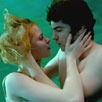 Sony Pictures
Sony PicturesReview in a Hurry: Across the Universe is ambitious, sprawling and exhausting. Imagine if Oliver Stone directed Austin Powers: a litany of psychedelic '60s clichés, outbursts of ridiculous song and dance interspliced with overwrought montages of sex, war and protests—all strung together with cheesy, mawkish dialogue. Universe tries to straddle the concepts of cultural commentary and frivolous fun, but the film wobbles and eventually flops.
The Bigger Picture: Director Julie Taymor could be one of the greatest visionaries working in Hollywood today. She could be one of the few filmmakers that successfully combines high-art concepts with accessible storylines and compelling characters. In Across the Universe, she could have reinvented and reinvigorated the musical genre by combining her stunning visual talents and the cherished music of the Beatles. She could have, but she didn’t. Instead, Taymor gives us the typical and tired musical schmaltz with some isolated moments of magnificent spontaneity that are disappointingly few.
The mortal flaw of the film is its thin and trite plot. Jude and Lucy—every character is named after a Beatles song, (irritatingly) cute isn’t it?—fall in love in New York city during the raucous and rebellious '60s. Jude is fleeing his dreary life as a Liverpool dockworker, and Lucy has left suburban New Jersey behind after her hunky boyfriend was killed in the war. They shack up with Lucy’s Ivy leaguer turned Bukowski bohemian brother, who shortly after their arrival gets drafted. Lucy is radicalized and starts hanging out with some scruffy kids who we assume are political activists, because they have bad fashion sense and make references to “the movement." Jude tunes out and spends most of his time pouting and painting. Needless to say, that whole Vietnam thing puts a mighty strain on their relationship, they fight, they croon, they reconcile, they sing on a rooftop, peace and love eventually flood the streets of New York.
It also doesn’t help that Taymor and her sorry, sloganeering writers can’t seem to make up their minds about the '60s. At times, the era is treated with a gauzy nostalgia, but at other moments it's given flip condescension, so the tone is uneven and unnerving. Taymor also doesn’t know what to do with the Beatles. The interpretation of most songs are surprisingly uninspired and do not punctuate or push the narrative along. “Hey Jude,” “Get by with a Little Help from My Friends” and the insipid “All You Need Is Love” finale are as predictable and tame as the plot. Then there are few sequences where Taymor reimagines the meaning of the songs and delivers a beautiful synthesis of lyrics, images and guitar. When the film’s long-delayed climax hits with our tortured lovers, protesters and dying soldiers sardonically singing "Strawberry Fields Forever," the moment is nothing short of breathtaking. But it only lasts a moment.
The 180—a Second Opinion: Taymor is a visual dynamo who is trying in earnest to create something original, something with vitality. So, if you’re willing to submit to the schmaltz and the clichés, then there is a fun anticipation in not knowing what creative imagery or long-loved song Taymor might use next.